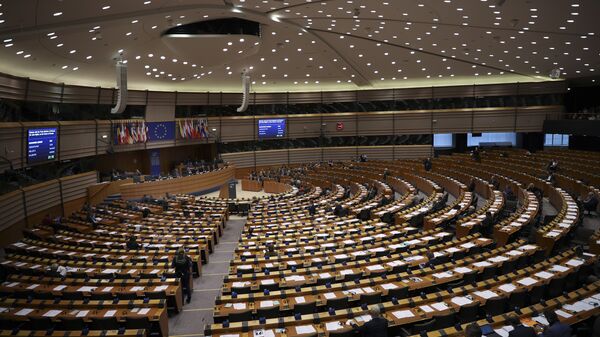On the first morning of the four-day EU Parliamentary Election marathon, Brussels looks pretty quiet. Military patrols are still in the streets, which is a reminder of the 2016 terrorist attacks, but it seems that everyone got used to these increased security measures and pays little attention to soldiers walking around the European Parliament compound.
Inside the EU parliament the mood is sleepy as well – there’s little staff in the hallways, there are no crowds anywhere on the premises. Visitors and journalists covering the election both have chance now for photo ops alongside the EU flags gallery.
— Denis Bolotsky (@BolotskySputnik) 23 мая 2019 г.
The vote in the UK is influenced heavily by Brexit. The country, which was set to part ways with Brussels in March, formally remains a part of the European Union, so British voters still have right to pick their candidates.
In the Netherlands the main battle for voters’ hearts and minds is being fought by Mark Rutte’s ruling People’s Party for Freedom and Democracy (VVD) and by the right-wing Forum for Democracy (FvD).
Forum for Democracy – a relatively new conservative party, which is known for its Euroscepticism and leniency towards Nexit — the idea of Holland leaving the EU, was formed in 2016 and has become a big winner in the Netherlands during the provincial elections two months ago, securing 86 seats spread across the country’s 12 provinces. In three provinces, including the capital region of South Holland it became the largest party.
New Dutch nationalist party promises 'to end the stupidity' of the liberal order, opposes mass immigration & excessive EU control, wins voters' trust: https://t.co/I5rLU0rz8O через @SputnikInt
— Denis Bolotsky (@BolotskySputnik) 22 марта 2019 г.
Although it doesn’t revolve around Nexit ideas directly, FvD’s campaign pledges to “take the power back from Brussels and giving it to The Hague.” In a tweet from May 23rd, which features the photos of the party leader Thierry Baudet and the lead candidate Derk Jan Eppink, Forum for Democracy promises voters “to go to Brussels with your support to stop the plans of [Leader of the Alliance of Liberals and Democrats for Europe Guy] Verhofstadt, [President of the European Commission Jean-Claude] Juncker and [Leader of the Dutch People's Party for Freedom and Democracy and the country's Prime Minister Mark] Rutte.”
Forum voor Democratie wil de macht terug van Brussel naar Den Haag. Met uw steun gaan wij naar Brussel om de plannen van Verhofstadt, Juncker en Rutte te stoppen! Ga vandaag stemmen en stem Forum voor Democratie! #FVD #EP2019 pic.twitter.com/wlxWlV1AZ2
— ForumvoorDemocratie (@fvdemocratie) 23 мая 2019 г.
On the week before the election the VVD posted an anti-Baudet video in YouTube with Soviet anthem in the background, calling the FvD leader a “Kremlin-sympathizer” and “Putin’s collaborator” – harsh accusations in Holland, which mostly follows into the footsteps of the US and NATO in its foreign policy.
VVD itself promised voters “to make Holland safer and more stable, to focus on migration, security and trade.” The party's leadership considers the possibility of Nexit "a disaster".
— VVD (@VVD) 20 мая 2019 г.
During Mark Rutte’s two terms as Prime Minister, his cabinet went through a lot of turmoil. Last year Dutch Foreign Minister Halbe Zijlstra resigned after admitting that he had lied about attending a meeting in 2006, during which, according to Zijlstra, Russian President Vladimir Putin had outlined a concept of building a greater Russia.
READ MORE: Fashionably Late: Dutch Media "Discovers" Government Supported Syrian Terrorists
In 2015-2017 the Dutch government supplied “non-lethal aid” to Syria’s “moderate rebel groups”, which included Toyota pickup trucks. In reality, journalistic investigation by Novini and several other news outlets have shown that the trucks were used by jihadists from Jabhat al-Shimaya (also known as the “Levant Front”) and other similar terrorist organizations, which, once again, landed the Rutte cabinet in hot water.
It’s unclear who will win most EU Parliament seats in the Netherlands, but many observers agree that right-wing conservatives could very well make a big leap forward.
— Europe Elects (@EuropeElects) 22 мая 2019 г.
The 2019 European Parliamentary elections are being held on May 23-26 in all 28 EU member states. The 751 deputies who will be picked by voters, will serve in the European Parliament for the next five years.




